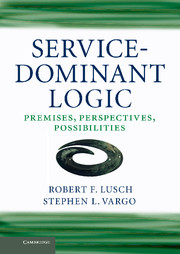Book contents
- Frontmatter
- Dedication
- Contents
- List of Exhibits
- Foreword
- Preface
- Acknowledgments
- Part I Premises
- 1 The service-dominant mindset
- 2 Roots and heritage
- 3 Axioms and foundational premises
- 4 Service as a guiding framework
- Part II Perspectives
- Part III Possibilities
- Appendix Reflection and dialogue
- Index
- References
2 - Roots and heritage
Published online by Cambridge University Press: 05 June 2014
- Frontmatter
- Dedication
- Contents
- List of Exhibits
- Foreword
- Preface
- Acknowledgments
- Part I Premises
- 1 The service-dominant mindset
- 2 Roots and heritage
- 3 Axioms and foundational premises
- 4 Service as a guiding framework
- Part II Perspectives
- Part III Possibilities
- Appendix Reflection and dialogue
- Index
- References
Summary
The great economic law is this: Services are exchanged for services … It is trivial, very commonplace; it is nonetheless, the beginning, the middle, and the end of economic science …
Frédéric BastiatIntroduction
Tracing the history of how a concept has been conceptualized, understood, and approached helps to uncover the roots and pathways that lead to its nuanced meanings today. These pathways diverge and converge as a function of the purposes of the times. A historic account of the development of economics and how it viewed service reveals a divergence in the understanding of value and value creation. This historic account points toward the development of an economic paradigm focused on tangible, transportable, and quantifiable value, with service seen as something left over, less valuable, and tertiary in economic development.
The traditional, dominant “worldview” developed from the idea that tangible goods could have (possess) utility (value) and be transported and exchanged for other goods, also possessing utility, thus increasing the wealth of both parties. We call this paradigm “goods-dominant” (G-D) logic. Arguably, it has become the most pervasive and foundational of the paradigms available for understanding business and economic exchange. Briefly stated, G-D logic postulates:
The purpose of economic activity is to make and distribute things that can be sold.
To be sold, these things must be embedded with utility (value) during the production and distribution processes and must offer to the consumer superior value in relation to competitors’ offerings.
The firm should set all decision variables at a level that enables it to maximize the profit from the sale of output.
For both maximum production control and efficiency, the good should be standardized and produced away from the market.
The good can then be inventoried until it is demanded and then delivered to the consumer at a profit.
- Type
- Chapter
- Information
- Service-Dominant LogicPremises, Perspectives, Possibilities, pp. 31 - 52Publisher: Cambridge University PressPrint publication year: 2014

